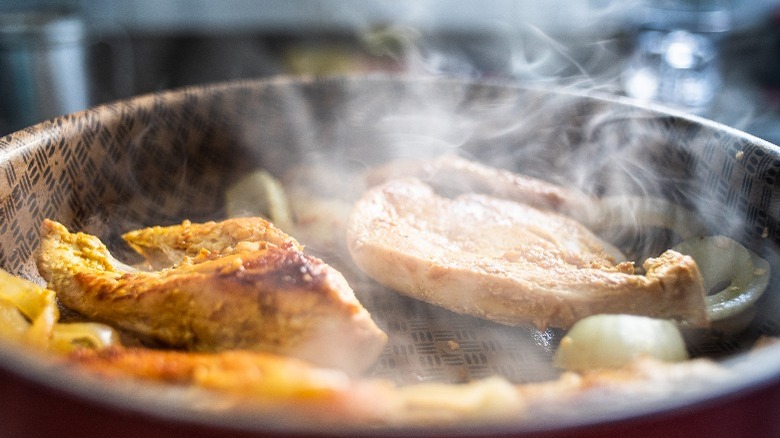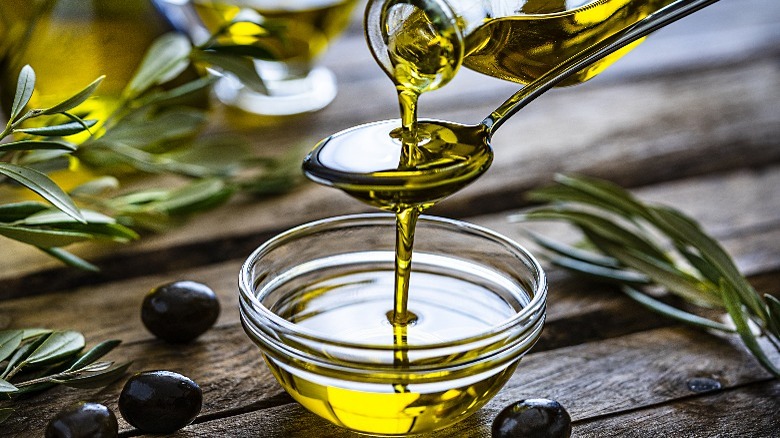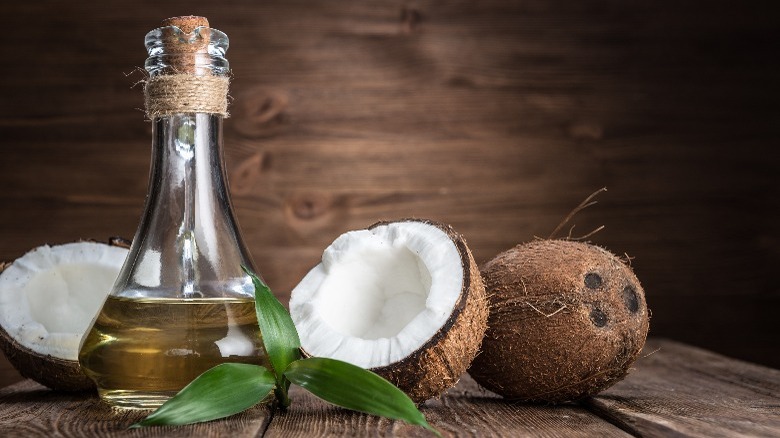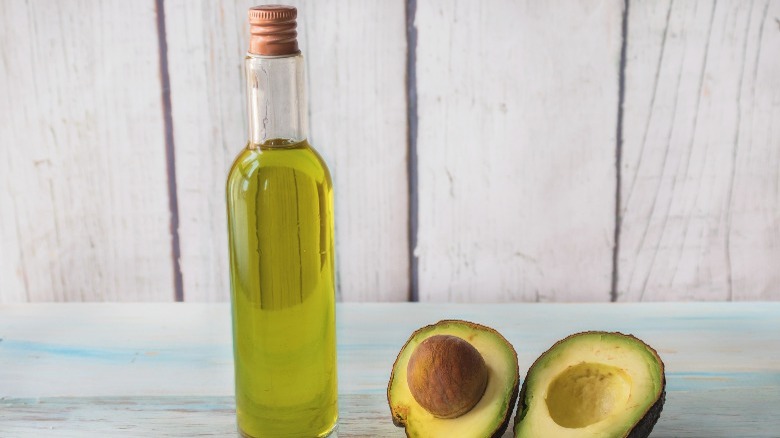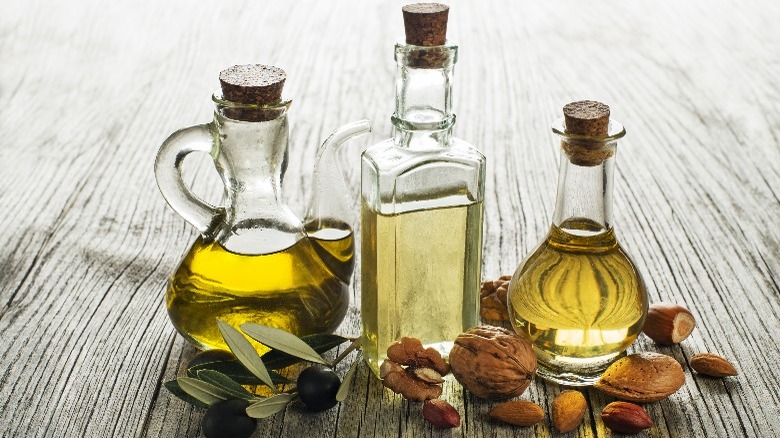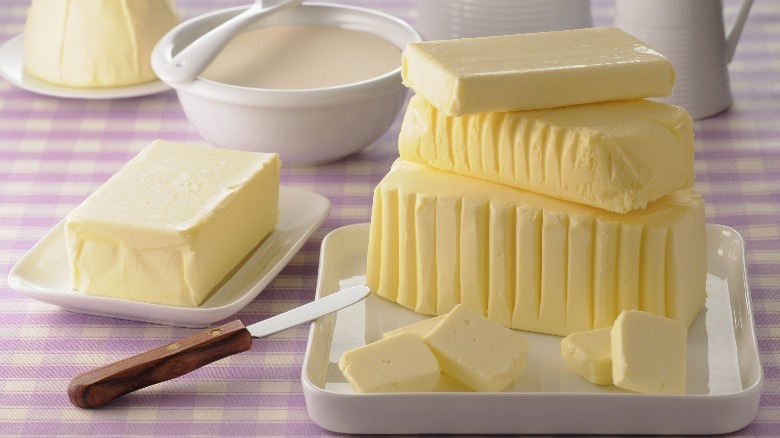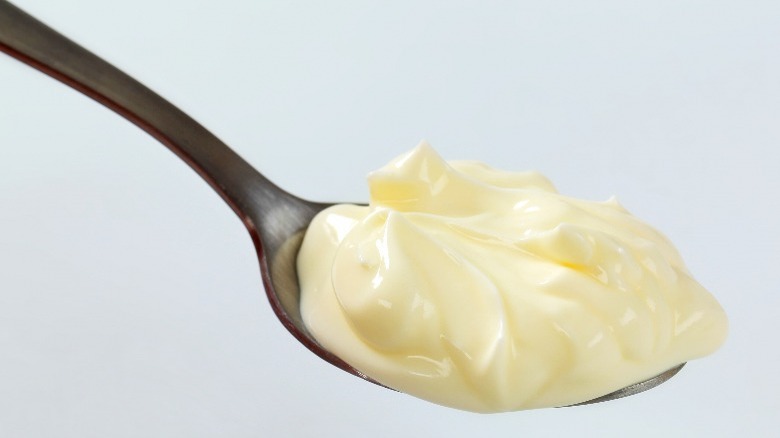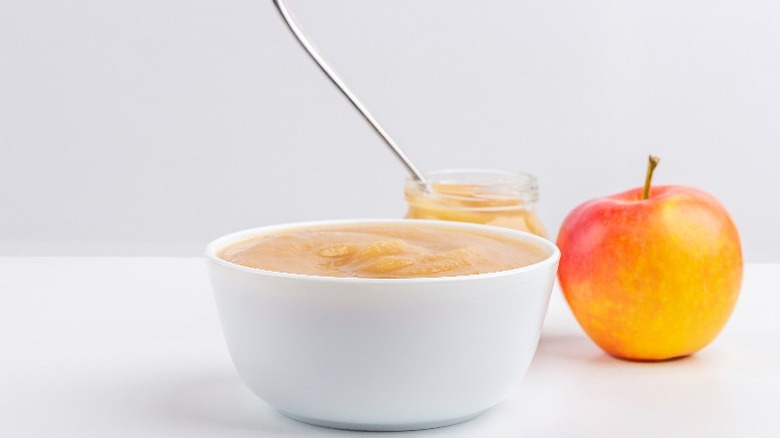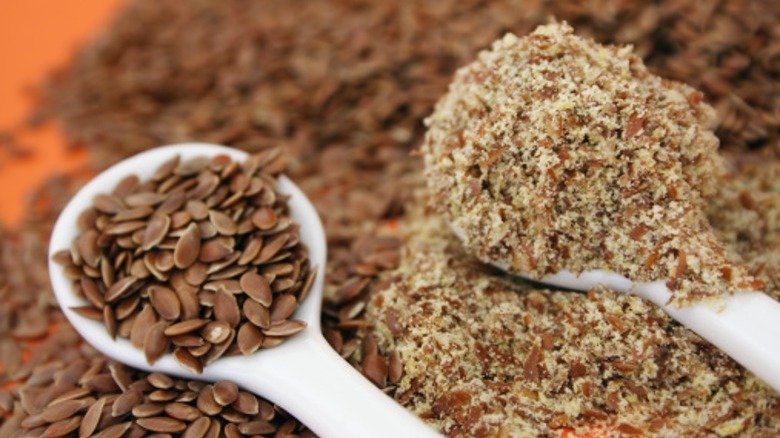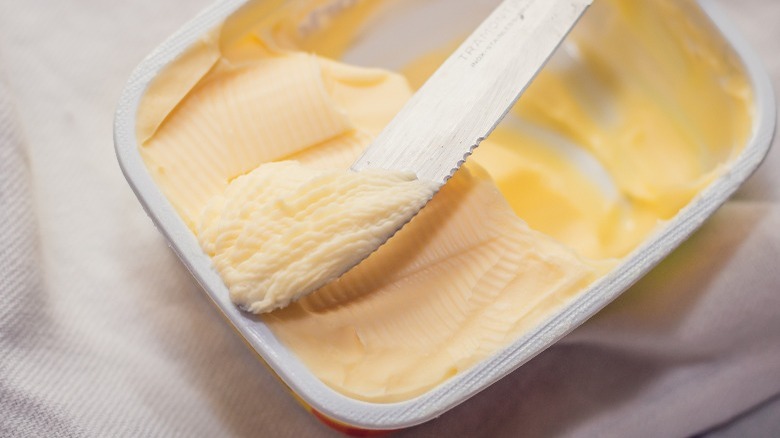The Best Vegetable Oil Substitutes For Every Occasion
Vegetable oil is one of the most commonly used oils for cooking due to its flexibility. But what do you do if you run out while cooking? Or, if your doctor tells you to cut down on vegetable oil? This guide can help you make healthy substitutes for vegetable oil.
While the term vegetable oil covers oils derived from many different vegetables or their seeds, only a few types are common. These include corn, soybean, and canola oil, or a blend of two or more. Because of its neutral flavor, vegetable oil is one of the most flexible oils available and is a common ingredient found in most recipes. It's also easy to use in any type of cooking, from baking to high-heat methods.
But you won't find vegetable oil in recipes from over 100 years ago. Modern industrial methods were necessary to create this food. That's partly why it is not the healthiest fat available in your kitchen despite the American Heart Association's (AHA) recommendations. What other problems can vegetable oil pose?
The problem with vegetable oils
Organizations like the AHA claim that vegetable oils are all healthy because they contain less saturated fats, like mono- and polyunsaturated fats, or PUFAs, but some say otherwise. Acclaimed author, physician, and functional medicine practitioner, Dr. Mark Hyman, believes that vegetable oil is bad for you.
Since the invention of processed oils, the American diet has been saturated with these products, which contain an essential fatty acid known as omega-6. Your body requires a proper balance of omega-6 and omega-3, which is found in healthy foods like salmon. Unfortunately, most Americans eat too much omega-6 and not enough omega-3.
Today's research links this unhealthy balance to many health concerns including cardiovascular disease, diabetes, weight problems, and bowel conditions. And a recent study from UC Riverside suggests that soybean oil can negatively impact neurological conditions such as autism and Alzheimer's, and even mental health challenges such as depression. Finally, these oils are primarily processed using hexane. While only trace amounts of this chemical get into the oils themselves, it is labeled an air pollutant by the EPA. The strain on the environment is another good reason to limit your use of vegetable oil.
The importance of smoke point
A key factor in making the best vegetable oil substitutions for different cooking methods is to know the smoke point of your cooking oil or fat. The smoke point is the temperature at which the oil in your pan begins to smoke. If you heat oil to this level and beyond, the oil can become unhealthy, the food will taste bad, and cancer-causing chemicals may be released into your food.
When frying or cooking on high heat, the higher the smoke point, the better. Various factors can impact the smoke point, including refinement, age of oil, and type of fat (i.e., PUFA). A smoke point of 400 degrees Fahrenheit or greater is considered best for all types of frying and high-heat cooking. Today, manufacturers use different blends, additives, and processes when making oils. It's best to discover the specific smoke point of your oil substitution with any high-heat cooking.
Sunflower oil
This oil has been called both healthy and unhealthy, and at times, is lumped in with the other vegetable oils mentioned above. The fact that they can be grouped as such make this an ideal one-to-one substitute, that is if sunflower oil is a healthier option. Pressed from sunflower seeds, this is another oil that is high in PUFAs, depending on which brand you buy. Some are higher in omega-6 fatty acids than others.
Sunflower oil is also high in the antioxidant vitamin E, which can help support your immune system. Its high smoke point makes it useful for all kinds of cooking. It also has a nutty flavor making it an excellent choice for salad dressings. However, most of the sunflower oil on your grocery store shelves is refined using chemicals. It might take some work to find one that is high in oleic acid, which means lower in PUFAs and better healthy fat content, but it is worth the effort.
Olive oil
Olive oil is a healthy substitute for vegetable oil. Made from the pressed fruit of olive trees, this particular type of oil has existed since ancient times. There are a few types of olive oil: extra virgin olive oil (EVOO), standard, pure, and light. Olive oil has a medium smoke point, but some now think you may be able to stop worrying about the smoke point in it. A recent study showed that it took 24 or more hours of frying for any harmful chemicals to be released.
That said, we recommend you keep your frying to certain dishes well accented by olive oil, such as chicken cutlets, and use refined olive oil. You can use it for baking with a one-to-one swap, but be careful of the flavor with your sweet dishes unless, of course, you're making olive oil cake. EVOO is best as a substitute oil for dressings and finishings. And who doesn't love a great piece of bread dipped in it?
Coconut oil
Coconut oil is available in both refined and unrefined. Refined cooking oils are those that have been processed by the manufacturer to achieve a particular effect. They tend to have a more neutral flavor, last longer, and work at higher heats than their unrefined counterparts.
While refined oils are more flexible for different types of cooking and generally a better substitute for vegetable oil, keep in mind that they are processed using other chemicals. Refined coconut oil is processed with sodium hydroxide, better known as lye. This is not necessarily harmful, but purists who want healthier choices should weigh the pros and cons of refined oils as a substitution versus their natural counterparts because the refined version is more flexible due to its neutral taste.
When using coconut oil for baking, keep all the other ingredients at room temperature when you mix them. When baking, you'll need to melt it and then cool it before it solidifies. Be careful as this can alter your measurements. Cooking with coconut oil is a great choice for frying, too — it partners well with tropical or Asian recipes.
Avocado oil
This heart-healthy oil is becoming a more popular and easy-to-find resource for your pantry. Avocado oil is pressed from the fruit, much like olive oil. They also share a similar fat and vitamin makeup. Refined avocado oil is bleached, which simply means exposed to high heat for processing, then deodorized for use in personal care products.
Avocado oil can be expeller-pressed or cold-pressed, but the expeller-pressed version can lose a bit of flavor when cooking. With a smoke point of 480 degrees Fahrenheit, however, there's no problem cooking on high heat. Refined avocado oil adds a subtle taste to your dish, depending on what you are cooking. While olive oil is one of the most popular oil substitutes for salad dressing in this category, it can get a little boring. Avocado oil that is less processed imparts a fruitier flavor to your salads and is a great choice for sautéing and finishing.
Nut oils: Almond and walnut
Nut oils are more typically used for dressings, dips, and finishing, but there are exceptions to every rule. Almond oil is a healthy fat that is low in sodium. However, is also high in calories — 120 per tablespoon. This oil is also available either cold-pressed or refined; we recommend refined for frying or baking. However, if you'd like to add a nutty flavor to your baked goods, you can blend refined and cold-pressed together to add them to baking recipes.
Another nut oil to try as a sub is walnut oil, made by grinding and pressing this nut. Healthy yet rich, the refined version of this oil should not be used for high-heat cooking or it can release an unpleasant taste. Instead, reserve it for salads and drizzling. You can, however, use it for baking — we think it would be great in brownie recipes! It's also ideal for sautéing vegetables. These oils are sometimes considered artisan oils and they have a price point to match. Use them in dishes that highlight their flavors.
Butter and butter substitutes
If you're completely out of oil or would like to avoid it altogether, these butter and dairy-free butter options can work well for you. Substituting butter for oil may sound unhealthy, but if you select a high-quality option (such as USDA-certified organic or grass-fed), you are making a good choice. Grass-fed dairy and meat are high in CLAs, which some studies have linked to losing weight and improving that omega-3 ratio. Because it is a fatty product, though, use it sparingly.
When substituting butter for oil, melt it first for a one-to-one swap for the vegetable oil required. Choose unsalted, unsweetened butter if you don't want to impact the flavor of what you're cooking. Another option is using a dairy-free butter substitute. Many of these combine soy and other oils and are often labeled plant-based. This is a good choice for anyone practicing a vegan diet. Two quality brands include Earth Balance, which has numerous varieties including soy-free, and Smart Balance.
The final vegetable oil substitute in this category is ghee, which is simply butter that is heated to remove the milk solids. Ghee does not contain milk proteins and, therefore, can be consumed by people with milk allergies. It also works well for high-heat cooking. You can also substitute this one-to-one, however, it is a bit thinner than butter so keep an eye on your measurements.
Substitute fats for baking
Yogurt, ricotta, cottage cheese, and mayonnaise sound like strange choices, but these fat substitutes for baking can help you add dimension to your baked goods. Yogurt is a healthier way to add extra moisture to baking recipes, giving a richer flavor. Try to use Greek yogurt so your recipe doesn't get too wet. If not, you can use plain or unsweetened yogurt. Drain cheeses or yogurt of the excess water first and use one-to-one replacement. If you eat dairy-free yogurt, you can attempt this but your results might not be the same.
Ricotta or cottage cheese is another substitution that gives baked goods some depth. Low-fat versions work best for an equal ingredient exchange as well. While traditional mayonnaise is not a healthy choice, many cooks swear that mayo adds richness and complexity to their baked goods. Because it is thick and won't melt, it makes a great oil substitute in bread recipes, keeping the dough moist while it rises. It will increase the caloric content of your foods so keep that in mind. This is another one-to-one baking swap option. We recommend trying a healthier brand of mayo or making your own.
Fruit-based options
One of the healthiest substitutes for vegetable oil is fruit. It's also the one you're most likely to have in your refrigerator. Replacing vegetable oil with applesauce when baking seems like a no-brainer but it's trickier than you might think. Most people assume will make their baked goods moist but its high water content can be a problem. You should limit baking with applesauce to recipes that have a liquid fat — no problem here since we are subbing for vegetable oil. Just keep in mind that you cannot swap this substitute for a hard fat.
You'll want to swap anywhere from 20% to 50% of the amount of oil that is required, but we have also seen higher recommendations. You can start at 50% and go higher next time. Pureed fruit may be tricky as well. Mashed bananas come highly recommended with a 50% swap as well, but remember, they have a strong flavor. Other purees you can try include pureed prunes and pumpkin puree, both with a weaker flavor.
Flaxseed oil and ground flaxseed
Flaxseed is a very healthy alternative to vegetable oil and is available as an oil and as ground seeds. Flaxseed oil is also known as linseed oil, and it is not appropriate for high-heat cooking but certainly wonderful to add a nut-like flavor to salad dressing. Ground flaxseed is a better option but it can be tricky to use. To substitute ground flaxseed, replace each tablespoon of vegetable oil with three tablespoons of flaxseed. Flaxseed is great to have on hand because you can use it as a substitute for both eggs and flour, allowing you to expand your cooking for people with even more dietary restrictions.
According to the Mayo Clinic, the health benefits of flaxseed include reducing cholesterol, lowering blood sugar, and aiding certain medical conditions such as heart disease, diabetes, and the symptoms of menopause. However, you should be aware that large amounts may interfere with drugs that address blood clotting, blood pressure, diabetes, and estrogen.
The one substitute to avoid
Now that we've gone over better choices for baking and cooking, there's one choice you should avoid: margarine. First off, margarine products all have different ingredients, giving you unreliable cooking results. But that's not the only problem. Margarine won't give you as rich a flavor as many of the fat substitutes we've already discussed, including butter. Its thin consistency can also be a challenge in getting your baked goods to hold up properly. That's because margarine contains a lot of water which can ruin or burn your recipes.
Additionally, some experts now say you should avoid margarine altogether for health reasons. It is a highly processed food, filled with chemicals that are not good for you, such as hydrogenated oil. Margarine makers are allowed to use a wide range of sources for the fat content that is required. That can come from just about anything, from fish oil to soy protein isolates. They are also allowed to contain numerous additives such as salt, sweeteners, flavors, dyes, and emulsifiers. That last item is needed to emulate a butter-like spread. There are many better options in your fridge when you need a substitute for vegetable oil, so choose wisely.



